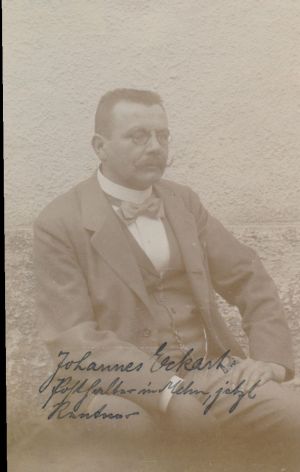Translations:Die Posthalterei der Familie Eckart/3/en: Unterschied zwischen den Versionen
(Die Seite wurde neu angelegt: „====== The End of the Postmaster Line in Munich ====== [[Datei:Johannes_CA_VIII_13.jpg|300px|thumb|right|"Johannes Eckart. Postmaster in Munich, now retired."]…“) |
Keine Bearbeitungszusammenfassung |
||
| Zeile 1: | Zeile 1: | ||
====== The End of the Postmaster Line in Munich ====== | ====== The End of the Postmaster Line in Munich ====== | ||
[[Datei:Johannes_CA_VIII_13.jpg|300px|thumb|right|"Johannes Eckart. Postmaster in Munich, now retired."]] After Gottfried Eckart, the second eldest son of Carl August Eckart, had given up the Emskirchen post house in 1865 | [[Datei:Johannes_CA_VIII_13.jpg|300px|thumb|right|"Johannes Eckart. Postmaster in Munich, now retired."]] After Gottfried Eckart, the second eldest son of Carl August Eckart, had given up the Emskirchen post house in 1865, due to competition from the new railway line, he moved to the neighboring town Neustadt an der Aisch. This is where he set up a new business as postmaster, before moving to [[Familie_Eckart_in_München/en|Munich]] in 1877. Before that, he had frequently been to Munich since he had already been a member of the Bavarian Landtag (Bavarian parliament). He had acquired Munich’s post-stable for approximately 50,000 marks, with effect from January 1, 1877. The old post-stable building, in those days the only one in Munich, was located between the streets Bayerstrasse and Schützenstrasse. However, the city government had the building demolished shortly afterwards. The new post house was built on a property at the address Dachauer Strasse 27, close to Munich’s central railway station. The property measured 3,750 square meters. In addition to the post house, there were stables for the overall 121 horses, apartments, dormitories and dining rooms for the 43 postilions, a commercial building and an administration building, where the administrators and the forage and feed masters lived with their families. The carriages and stagecoaches were parked in the courtyard, on an area spanning 500 square meters with a roof made of glass and corrugated sheet metal. Gottfried’s career as Munich postmaster ended abruptly in 1880: He fell ill with typhoid fever, probably caused by contaminated water, and died within a matter of days. | ||
His wife Karoline Eckart continued to run the post-stable. She appointed her sons [[Carl August (CA VIII 11)/en|Carl August]] and [[Johannes Philipp (CA VIII 13)/en|Johannes]] as managing directors in 1880 and 1882, respectively, as support. Following Karoline’s death in 1901, the brothers officially became Royal Bavarian Post-Equerries. However, the Munich post house had become unprofitable by that time. The brothers sold the post-stable and terminated their contract as postmasters that same year. After nearly 150 years, this marked the end of an era for the Eckarts as postmasters.<ref>Eckart, Otto and Kamp, Michael: "Die Geschichte der Familie Eckart. Von Franken nach München und Hawaii" (The History of the Eckart Family. From Franconia to Munich and Hawaii), Munich 2015, pages 163ff.</ref> | His wife Karoline Eckart continued to run the post-stable. She appointed her sons [[Carl August (CA VIII 11)/en|Carl August]] and [[Johannes Philipp (CA VIII 13)/en|Johannes]] as managing directors in 1880 and 1882, respectively, as support. Following Karoline’s death in 1901, the brothers officially became Royal Bavarian Post-Equerries. However, the Munich post house had become unprofitable by that time. The brothers sold the post-stable and terminated their contract as postmasters that same year. After nearly 150 years, this marked the end of an era for the Eckarts as postmasters.<ref>Eckart, Otto and Kamp, Michael: "Die Geschichte der Familie Eckart. Von Franken nach München und Hawaii" (The History of the Eckart Family. From Franconia to Munich and Hawaii), Munich 2015, pages 163ff.</ref> | ||
Version vom 22. Juli 2021, 19:29 Uhr
The End of the Postmaster Line in Munich
After Gottfried Eckart, the second eldest son of Carl August Eckart, had given up the Emskirchen post house in 1865, due to competition from the new railway line, he moved to the neighboring town Neustadt an der Aisch. This is where he set up a new business as postmaster, before moving to Munich in 1877. Before that, he had frequently been to Munich since he had already been a member of the Bavarian Landtag (Bavarian parliament). He had acquired Munich’s post-stable for approximately 50,000 marks, with effect from January 1, 1877. The old post-stable building, in those days the only one in Munich, was located between the streets Bayerstrasse and Schützenstrasse. However, the city government had the building demolished shortly afterwards. The new post house was built on a property at the address Dachauer Strasse 27, close to Munich’s central railway station. The property measured 3,750 square meters. In addition to the post house, there were stables for the overall 121 horses, apartments, dormitories and dining rooms for the 43 postilions, a commercial building and an administration building, where the administrators and the forage and feed masters lived with their families. The carriages and stagecoaches were parked in the courtyard, on an area spanning 500 square meters with a roof made of glass and corrugated sheet metal. Gottfried’s career as Munich postmaster ended abruptly in 1880: He fell ill with typhoid fever, probably caused by contaminated water, and died within a matter of days.
His wife Karoline Eckart continued to run the post-stable. She appointed her sons Carl August and Johannes as managing directors in 1880 and 1882, respectively, as support. Following Karoline’s death in 1901, the brothers officially became Royal Bavarian Post-Equerries. However, the Munich post house had become unprofitable by that time. The brothers sold the post-stable and terminated their contract as postmasters that same year. After nearly 150 years, this marked the end of an era for the Eckarts as postmasters.[1]
- ↑ Eckart, Otto and Kamp, Michael: "Die Geschichte der Familie Eckart. Von Franken nach München und Hawaii" (The History of the Eckart Family. From Franconia to Munich and Hawaii), Munich 2015, pages 163ff.
